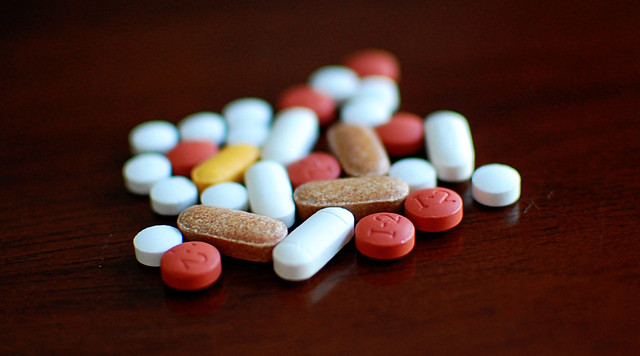Statins and antidepressants prescriptions have increased in the last five years in Birmingham, according to new data.
Atorvastatin -the most prescribed statin in the region- has increased by more than 60% over the last five years in Birmingham and Solihull, from 490 000 in 2015 to more than 800 000 in 2019, an analysis of NHS prescriptions data has revealed.
Philippa Hobson, Senior Cardiac Nurse at the British Heart Foundation said: “As our population ages and more people undergo health checks, a greater number are likely to be prescribed statins.”
On the other hand, Simvastatin prescriptions have decreased by almost 40% over the same period.
Hobson said: “Atorvastatin tends to be the statin of choice today, with patients experiencing less of the muscle ache problem that Simvastatin caused. However, if you’re on Simvastatin – and it’s effective – you may not need to change.”
Prescriptions for the other three statins, which are far less used, have followed a similar pattern: Rosuvastatin and Fluvastatin have increased by 37% and 20% respectively, while Pravastatin has decreased by 10%.
¿More depression or less stigma?
Sertraline is the most prescribed antidepressant in Birmingham and Solihull. Its prescriptions have more than doubled in the last 5 years in the region, from 12 584 items in November 2014 to 26 812 in October 2019. .
Prescriptions for Amitriptyline and Mirtazapine, two of the most widely used antidepressants, have also risen. The only one that has decreased is Citalopram, which has dropped 8% in the last 5 years.
Marjorie Wallace, chief executive of the mental health charity SANE, said this increase in the West Midlands was not surprising: “This is reflected in the national picture and in the number of callers to us, who say that they are experiencing more frequent and acute periods of depression and anxiety.”
Prescriptions for other antidepressants such as Venlafaxine, Escitalopram, Duloxetine and Fluoxetine have also increased.
Emma Carrington, Advice and Information Manager at Rethink Mental Illness, said that an increase in the number of people being prescribed antidepressants does not necessarily mean that an increasing number of people are experiencing depression. “While there’s still some stigma, it has reduced considerably, and people now feeI much more comfortable asking for help when they need.”
Wallace said: “Some of the increase is due to recent guidelines that people should have repeated prescriptions for antidepressants, as staying on them for longer is shown to be more effective.
“There has also been an increase in identifying and diagnosing depression amongst GPs and other professionals.”
What happens next?
A new injection could replace statins
The NHS has announced a new form of medicine, an injection called Inclisiran that is in clinical trial and could be offered to NHS patients by the end of the year. This injection could avoid or complement the use of statins. Health Secretary Matt Hancock said the initiative ‘could save 30,000 lives during the next decade.’
Professor Sir Nilesh Samani, Medical Director at the British Heart Foundation said: “Lowering your LDL or ‘bad’ cholesterol is a key goal in reducing your risk of suffering a heart attack or stroke. This injection under the skin may be a safe and effective way of lowering LDL cholesterol.”
The new medicine would be injected twice a year. Sir Samani said: “Some patients may prefer to have this treatment rather than taking a pill every day.”
He added: “More work is needed to prove the long-term safety of the drug, but this could provide a significant advance in preventing heart and circulatory disease.”
Making lifestyle changes is important to help prevent this illness. Hobson said: “Eating a healthy Mediterranean diet, staying active, maintaining a healthy weight and not smoking can reduce your risk of heart and circulatory diseases.”
Issues with getting mental health support
The fear of being labelled or not wanting to admit that they are struggling with their mental health are some of the main obstacles people face in seeking help.
Carrington said: “In some cases, they may not even know that they need help. Many of our supporters have told us that they just assumed everyone felt the same way that they did, and that it was natural to feel low all the time.”
Waiting lists for therapy can be an additional problem. Wallace said antidepressants may be helpful, but the benefits must be weighed against the side effects, and for some people ‘they have no therapeutic value’. “This is why it is so important to ensure that talking therapies are made available and that people are not kept waiting until they reach a crisis.”
The type of therapy most commonly used for depression is called Cognitive Behavioural therapy (CBT). Carrington said: “There are websites people can use to teach themselves CBT techniques and other ways to help themselves. This can be a helpful thing to do whilst you are waiting for therapy.”
She added: “We need to take into account people’s needs outside of medication. If they’re depression is particularly serious, do reasonable adjustments need to be made to ensure that they don’t lose their job. They might be socially isolated, and would benefit from attending a local social club or support group. Or they might have money problems and might not know who to turn to in order to get help.
“Antidepressants can be an extremely effective way of managing the symptoms of depression, but they are only made more effective when all of a person’s needs are taken into account.”
The data have been obtained from the NHS Open Prescribing API . Prescriptions from Birmingham and Solihull Clinical Commissioning Group (CCG) are included. Sandwell & West Birmingham CCG is not included.
The latest data available for 2019 is from October, the totals for that year have been estimated taking into account the increase from October to December in previous years.
Get the data

